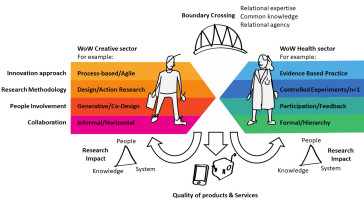Background: Acquiring the theoretical and practical knowhow of conducting patient and public involvement (PPI) in research is not part of the traditional curriculum of researchers. Zuyd University of Applied Sciences and Huis voor de Zorg, a regional umbrella patient organization, therefore started a 1.5-year coaching programme. Objective: To establish a community of practice by developing a PPI coaching programme for senior and junior health services researchers of Zuyd University. The context consisted of research projects conducted by the participants. Methods: A participatory action research methodology. Data were collected from reports of thematic group meetings and individual sessions with participants, field notes and regular reflection meetings with the project team. Data were analysed by reflexive deliberation. Findings: The programme comprised a kick-off meeting (52 attendees), followed by 7 group meetings with 11 junior and 9 senior researchers. The project team constructed a serious game based on the concept of the participation ladder. Questions and concerns differed for junior and senior researchers, and separate tailored meetings were organized for both groups. Between group meetings, participants received individual assignments. Group meetings were accompanied by individual coaching sessions to provide tailor-made feedback. The programme concluded with a combined meeting with all stakeholders. Conclusion: Building a community of PPI practice through action research facilitates the development of a coaching programme that fosters social learning, empowerment and the development of a shared identity concerning PPI. The role and responsibilities of senior researchers should be distinguished from those of junior researchers.
DOCUMENT

Active participation of stakeholders in health research practice is important to generate societal impact of outcomes, as innovations will more likely be implemented and disseminated in clinical practice. To foster a co-creative process, numerous frameworks and tools are available. As they originate from different professions, it is not evident that health researchers are aware of these tools, or able to select and use them in a meaningful way. This article describes the bottom-up development process of a compass and presents the final outcome. This Co-creation Impact Compass combines a well-known business model with tools from design thinking that promote active participation by all relevant stakeholders. It aims to support healthcare researchers to select helpful and valid co-creation tools for the right purpose and at the right moment. Using the Co-creation Impact Compass might increase the researchers’ understanding of the value of co-creation, and it provides help to engage stakeholders in all phases of a research project.
DOCUMENT

Founded in 2004, the Games for Health Project supports community, knowledge and business development efforts to use cutting-edge games and game technologies to improve health and health care. The Games for Health Conference brings together researchers, medical professionals and game developers to share information about the impact of games, playful interaction and game technologies on health, health care and policy. Over two days, more than 400 attendees participate in over 60 sessions provided by an international array of 80+ speakers, cutting across a wide range of activities in health and health care. Topics include exergaming, physical therapy, disease management, health behavior change, biofeedback, rehab, epidemiology, training, cognitive health, nutrition and health education.
DOCUMENT
Developing and realizing an innovative concept for the Active Aging campus in two years, where students, teachers, companies, residents of surrounding Campus neighborhoods will be invited to do exercise, sports, play, meet and participate. This includes, on the one hand, providing input with regard to a mobility-friendly design from an infrastructural perspective and, on the other hand, organizing activities that contribute to Healthy Aeging of the Zernike site and the city of Groningen. It is not only about having an Active Aging campus with an iconic image, but also about the process. In the process of realization, students, teachers, researchers, companies and residents from surrounding districts will be explicitly involved. This includes hardware (physical environment / infrastructure), software (social environment) and orgware (interaction between the two).
Developing a framework that integrates Advanced Language Models into the qualitative research process.Qualitative research, vital for understanding complex phenomena, is often limited by labour-intensive data collection, transcription, and analysis processes. This hinders scalability, accessibility, and efficiency in both academic and industry contexts. As a result, insights are often delayed or incomplete, impacting decision-making, policy development, and innovation. The lack of tools to enhance accuracy and reduce human error exacerbates these challenges, particularly for projects requiring large datasets or quick iterations. Addressing these inefficiencies through AI-driven solutions like AIDA can empower researchers, enhance outcomes, and make qualitative research more inclusive, impactful, and efficient.The AIDA project enhances qualitative research by integrating AI technologies to streamline transcription, coding, and analysis processes. This innovation enables researchers to analyse larger datasets with greater efficiency and accuracy, providing faster and more comprehensive insights. By reducing manual effort and human error, AIDA empowers organisations to make informed decisions and implement evidence-based policies more effectively. Its scalability supports diverse societal and industry applications, from healthcare to market research, fostering innovation and addressing complex challenges. Ultimately, AIDA contributes to improving research quality, accessibility, and societal relevance, driving advancements across multiple sectors.
Wat dragen creatieve onderzoeksmethodes bij aan vernieuwing binnen de zorg? We onderzoeken dit binnen tien projecten van het Create Health-programma van ZonMw. In deze projecten wordt kennis ontwikkeld over de toegevoegde waarde van creatieve manieren van werken bij e-health innovatie.
